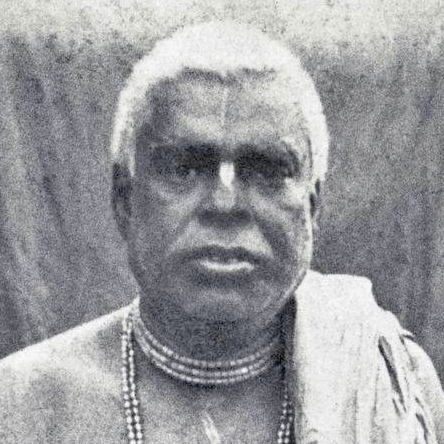Continuing our presentation of the upcoming release Sharanagati, in this song Srila Bhakti Vinod Thakur expresses the natural feelings in the surrendered souls’ hearts. Srila Bhakti Nirmal Acharya Maharaj frequently emphasises the third verse of this song.
Sharanagati
Song Eleven
mānasa, deha, geha, yo kichhu mora
arpilu̐ tuyā pade nanda-kiśora [1]
mānasa (mana)–mind; deha–body; geha (gṛha)–home; yo–which; kichhu–something; mora–mine; arpilu̐ (arpaṇa karilāma)–I offered; tuyā (tomāra)–Your; pade–at the feet; nanda–of Nanda Mahārāj; kiśora–adolescent son. [1]
(1) I have offered my mind, my body, my household, and whatever else may be mine at Your feet, O Nanda Kishor!
sampade vipade jīvane maraṇe
dāya mama gelā tuyā o pada varaṇe [2]
sampade–in happiness, good fortune, affluence, health; vipade–in distress, danger, poverty, sickness, misfortune; jīvane–in life; maraṇe–in death; dāya (dāyitva)–responsibility, anxiety; mama–my; gelā–went; tuyā–Your; o–those; pada–feet; varaṇe–by accepting, choosing. [2]
(2) In good times and in bad, in life and in death, all responsibility has gone away by embracing Your feet.
mārabi rākhabi yo ichchha tohārā
nitya-dāse prati tuyā adhikārā [3]
mārabi (māribe)–You may kill; rākhabi–You may protect; yo (ye)–which; ichchha–desire; tohārā–Your; nitya–eternal; dāse–to Your servant; prati–towards; tuyā–Your; adhikāra–authority. [3]
(3) You may kill me or You may protect me according to Your desire. You have full authority over Your eternal servant.
janmāobi moye ichchhā yadi tora
bhakta-gṛhe jani janma ha-u mora [4]
janmāobi–You may cause to take birth; moye–to me; ichchhā–desire; yadi–if; tora–Your; bhakta–(of a) devotee; gṛhe–in the home; jani (yena)–so that; janma–birth; ha-u (ha-uka)–let be; mora–my. [4]
(4) If it is Your desire that I take birth again, let me do so in the home of Your devotee.
kīṭa janma ha-u yathā tuyā dāsa
bahir-mukha brahma-janme nāhi āśa [5]
kīṭa–a worm, insect; janma–birth; ha-u–may be; yathā–as long as; tuyā–Your; dāsa–servant; bahir–outward; mukha–facing; brahma–as Brahmā, the universal creator; janme–such a birth; nāhi–not; āśa–desire. [5]
(5) Let me be born again even as a worm, so long as I can remain Your servant. I have no desire to be born even as Brahma, if I will be averse to You.
Sri Laghu-chandrika-bhasya
(5) kīṭa janma ha-u: “Let me be born again even as a worm …” This sentiment has been expressed by Sri Jamun Acharya in his Stotra-ratna (55):
tava dāsya-sukhaika saṅgināṁ
bhavaneṣv astv api kīṭa-janma me
itarāv asatheṣu mā sma bhūd
api me janma chaturmukhātmanā
“O Lord! Let me take birth, even as a worm, in the home of those whose sole happiness is Your service. O Lord, never let me take birth, even as Brahma, among those who are averse to You.”
bhukti-mukti-spṛhā-vihīna ye bhakta
labha-ite tā̐’ka saṅga anurakta [6]
bhukti–mundane enjoyment, exploitation; mukti–liberation, renunciation; spṛhā–desire; vihīna–without; ye–who; bhakta–devotees; labha-ite (lābha karite)–to obtain; tā̐’ka (tā̐dera)–their; saṅga–association; anurakta (anurāga)–attachment (loving attachment). [6]
(6) I am always eager to obtain the association of devotees who are completely devoid of all desire for mundane enjoyment and liberation.
(6) bhukti-mukti-spṛhā: “Desire for mundane enjoyment and liberation.” In this regard the following verse from Sri Bhakti-rasamrita-sindhu (1.2.22) should be mentioned:
bhukti-mukti-spṛhā yāvat piśāchī hṛdi vartate
tāvad bhakti-sukhasyātra katham abhyudayo bhavet
“So long as the desires for mundane enjoyment and liberation, which are like two witches, remain in the heart, how can the ecstasy of devotion manifest there?”
janaka, jananī, dayita, tanaya
prabhu, guru, pati tuhu̐—sarva-maya [7]
janaka–father; jananī–mother; dayita (priya)–beloved; tanaya–son; prabhu–Lord; guru–spiritual master; pati–husband; tuhu̐–You; sarva–all; maya–consist of. [7]
(7) Father, mother, lover, son, Lord, guru, husband—You are everywhere.
(7) tuhu̐ sarva-maya: “You are everywhere.” That is to say, “The deep touch of Your connection is all-pervading. (Essentially, in all my relationships I am relating with You.)”
bhakati-vinoda kahe śuna kāna!
rādhānātha! tuhu̐ hāmāra parāṇa [8]
bhakati-vinoda–Bhakti Vinod; kahe–says; śuna–please listen; kāna! (kānāi!)–O Kṛṣṇa; rādhānātha!–O Lord of Rādhā; tuhu̐–You; hāmāra–my; parāṇa–life, soul (the sole focus of my loving attachment). [8]
(8) Bhakti Vinod says, “Please listen, O Kān! O Rādhānāth! You are my life and soul.”



Leave a Reply